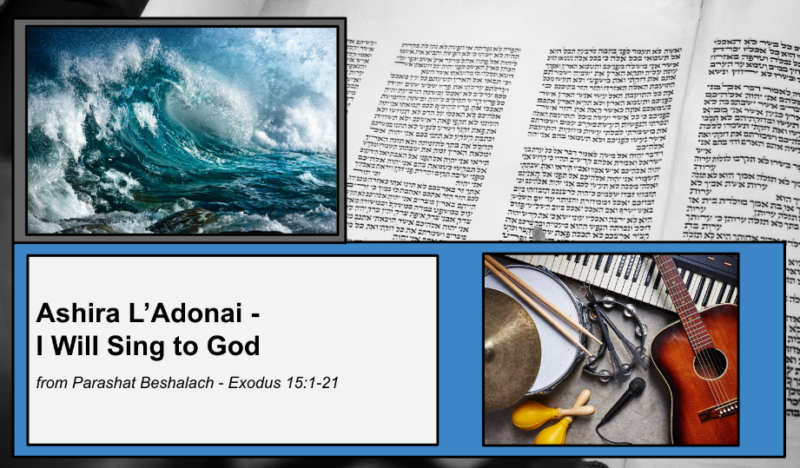Guest Post: “Ashira L’Adonai – I Will Sing to God”
This guest post is from cantorial soloist and CBI member Ziva Larson, who led Shabbat services on Saturday, January 27, 2024.
Our Torah portion this week, Beshalach, contains Shirat Hayam, the Song of the Sea – the song that the Israelites sang after they successfully crossed the Red Sea.
Shirat Hayam begins with the words “Ashira l’Adonai” (אָשִׁירָה לַיהֹוָה) – “I will sing to God” – and continues by expressing gratitude and awe for the gift of freedom.
But what exactly does it mean to “sing to God?”
When the Israelites sang Shirat Hayam after crossing the Red Sea, not only had they just successfully crossed a body of water that they had feared impassable, but also they had just escaped their pursuers and former enslavers, the people of Mitzrayim.
The Hebrew word “Mitzrayim” (מִצְרַיִם) is generally translated as “a narrow place.” Therefore, Shirat Hayam – the song that the Israelites sang to God as they transitioned out of and were liberated from their “narrow place” of slavery and oppression – can be interpreted as an action that assists with the transition out of “narrow places.”
If we accept this interpretation, then “singing to God” can be understood more broadly as any action that helps us to transition out of our own narrow places – out of the tough times in life, both big and small.
It is also apparent – from the context and the words – that the song the Israelites sang to God was an expression of deep joy, awe, and gratitude. In other words, singing to God enabled the Israelites to feel and express their emotions. And by doing so, their song came from their innermost selves – from their hearts.
Therefore, “singing to God” can also be understood as doing something that helps us to feel and express our emotions. It can also be understood as doing something from the heart. Or, slightly rephrased, as doing something that makes our own hearts sing.
Finally, in Shirat Hayam, the reference to “singing to God” appears in two forms: individual (“Ashira l’Adonai” (אָשִׁירָה לַיהֹוָה) – “I will sing to God”) and communal (“Shiru l’Adonai” (שִׁירוּ לַיהֹוָה) – “[All y’all] sing to God”).
Therefore, “singing to God” can be done individually or as part of a community. It can also involve connecting more deeply with yourself or with others.
So what does this all mean for us?
There is no single answer, as every person is an individual, and different things hold different meanings for different people at different times.
However, some possible lessons we can learn from the idea of “singing to God” include:
- Pausing from our everyday tasks (like the Israelites paused after crossing the Red Sea before continuing their journey) to notice the world around us and the blessings in our lives and to make time for things that bring us joy and help sustain us.
- Intentionally using things that bring us joy to help us transition out of tough times, decompress, and rediscover our connection to ourselves, others, and the world.
- Finding and taking opportunities for releasing emotions, resting, restoring, and resetting.
- Doing things that “make our hearts sing.” In other words, doing any activity that we’re passionate about, that brings us joy, or that helps us feel more connected to ourselves, to others, and/or to the world around us.
For example, we might:
- Sing/make music with others
- Engage in social justice work
- Go for a walk in nature
- Journal
- Care for another person
- Play sports
- Work on a puzzle or play a board game with friends
- Read a book
- Learn something new
- Share a meal with friends or family
- Take time to just sit and be
The possibilities are endless.
Whatever the answer might be for each of us, may we all find and be inspired to create opportunities to “sing to God,” and may the things we do in the spirit of “singing to God” make our own hearts sing and bring us joy, connection, healing, peace, and a sense of wholeness. Shabbat shalom.
References
- Sefaria:
- Torah: Exodus 15:1-21 (Beshalach)






